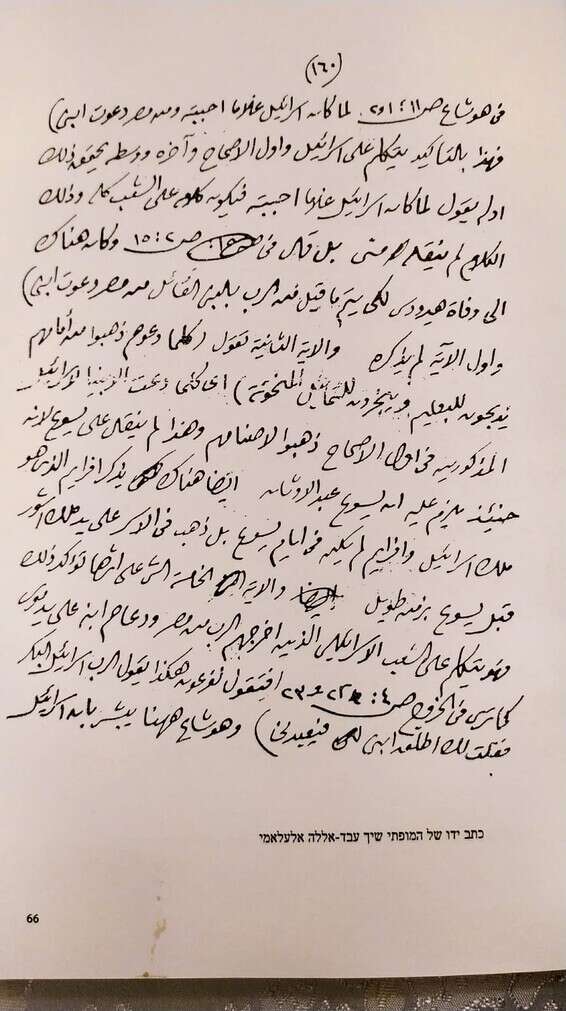115 years after the collaboration, which led to joint study, the depth of the connection between Rabbi Ohana and Sheikh 'Abd Allah Al-Alami was revealed • Among other things, documents were found signed by the rabbi
Rabbi Nissim Ohana
Photography:
Wikipedia
To study a weekly Bible lesson with the Mufti of Gaza? - No, this is not a wild fantasy, but a true story that took place in the city 115 years ago, when the rabbi of Gaza Jews, Rabbi Nissim Binyamin Ohana, studied with Sheikh 'Abd Allah al-Alami twice a week. The story, which is semi-familiar, was first revealed in detail as part of the "Hakima" project, which seeks to bring to the Israeli audience stories from the world of the sages of the East.
"In those years, a Christian mission was established in Gaza," explains Rabbi Dr. Hezi Cohen, the editor-in-chief of Hakima.
The Mufti asked the rabbi questions in the Bible and the Talmud, and the Mufti wrote the answers for himself in Arabic, so that he could read them and answer the difficult questions he was asked. Later, when Rabbi Nissim Binyamin Ohana was appointed rabbi of Haifa, he took the notes with him, translated them into Hebrew and published His answers to the Mufti as a book called "Know What You Will Answer Epicurus: Clear Answers from the Bible Itself."
Rabbi Nissim Ohana was born in Algeria in 1881 and immigrated to Israel at the age of 6 with his family.
After growing up and being ordained a rabbi, he was appointed chief rabbi of Gaza - where he established the first Hebrew school of its kind, at whose inauguration Eliezer Ben Yehuda participated.
Afterwards, Rabbi Ohana served as rabbis in New York, Fort Said, Alexandria and the island of Malta, later returned to Israel and was appointed rabbi of Haifa, and in that capacity he also spiritually accompanied three Irgun members executed by the British. Ohana halakhic essays, articles and piyyutim, died and was buried in Haifa.
The story of the joint study is in a letter attached to one of the copies of the book.
"In Gaza, the missionaries set up a clinic where all the patients would be received," says Rabbi Ohana in a letter he signed, "and as is well known, there was a place for prayer and speeches before those gathered about Jesus and the New Testament." "The Mufti of Gaza, Sheikh Al-Alami, who did not like the missionaries' claims, turned to Rabbi Ohana to help him refute them." The Mufti is a book compiled from the Torah, the prophets and Talmudic legends, and not as they are told. The above approached me and visited me twice a week in my house, "the rabbi writes," and always submitted to me questions about all the chapters and all the verses in the New Testament and demanded that I give him clear answers from the Bible itself.
He sat down and wrote in his handwriting all the answers in Arabic script.
"His manuscript remains with me to this day, and so this book was written with clear evidence for all generations, so that the last generation would know ... what was in Gaza."
The story of the friendship between the rabbi and the Mufti is one of the 300 stories about the sages of the East on the "Hachima" website, which brings stories from the lives of sages and sages from all over the East - including Afghanistan, Georgia and even Lebanon.
Videos, commentary articles, lesson plans and even a podcast on the subject of Eastern sages will soon be uploaded to the site.
At the same time, the people in the venture run an active Facebook group with 3,500 members.
"We try to bring the sages of the East to the forefront of the stage," explains Rabbi Dr. Cohen. "Today it is easy to find Hasidic stories for every need, but this is not the case with the stories of the sages of the East.
We want to fix that and let anyone who wants good stories tell.
In the Mizrahi story, community is a basic value, so you will find many stories about the efforts of Mizrahi sages to bring everyone into the synagogue and stories about the community, the family and the home.
Therefore, you will also find in them halakhic flexibility and caring, sometimes rather rigid, when everything is derived from this value of communality.
The stories we seek to tell are not stories about the past, but about what our present and future should look like - in light of the past.
We believe that Israeli society needs this Mizrahi voice. "

